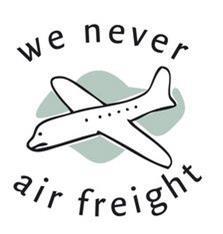
The organisation is consulting development charities, environmentalists, organic consumers and businesses in the UK and overseas as well a broad range of other interested parties. The consultation closes on September 28.
The chair of the Soil Association standards board, Anna Bradley, said, “As awareness of climate change has grown, concerns have been raised about the damage caused to the environment by air freight. However, when reducing our impact on the world’s climate, we must carefully consider the social and economic benefits of air freight for international development and growth of the organic market as a whole. Through a public consultation, the Soil Association is taking a lead role in tackling this complex issue.“
The association’s standards board is considering five options and has detailed the risks and benefits below:
Option 1: Take no action
The Soil Association would continue campaigning for local, seasonal and organic food but the Standards Board would not develop standards limiting or prohibiting air freight.
RISK: This option poses significant risk to the integrity of organic food. Air freight’s contribution to climate change is clearly at odds with the Soil Association’s environmental principles and the expectations of consumers who buy organic for environmental reasons. Indications are that businesses relying on air freight are environmentally and economically unsustainable, therefore allowing continued growth could be irresponsible.
BENEFIT: International trade in organic food has helped the UK’s organic market grow and can be a catalyst for organic movements elsewhere in the world. Certain organic products will be on the shelves all year round, competing with their non-organic counterpart. In addition, air freight enables producers in developing countries to access high value export markets, providing vitally needed jobs and opportunities to add value.
Option 2: A general ban (introduced over a number of years)
RISK: A general ban could potentially inhibit growth of the organic market and attract criticism from the countries affected and from development organisations. Focusing on air freight could be considered disproportionate and unfair when the majority of the CO2 emissions from UK food transport occurs on UK roads.
BENEFIT: The projected growth of the aviation industry is a threat to efforts to mitigate climate change. To tackle climate change effectively we need to urgently reduce emissions from all sectors. Banning air freight would send a clear message that transporting food by air is unsustainable. This could be part of a strategy for encouraging developing countries to establish patterns of sustainable agriculture. This approach could be more in line with the expectations consumers have of organic food.
Option 3: A selective ban (i.e. with exemptions, introduced over a number of years)
RISK: We would need to communicate clearly when and why we are allowing air freight to ensure we are not considered to be acting inequitably. The practicalities of implementing a selective ban could be considerable involving social or political judgements that are extremely difficult for an organic certification body to make.
BENEFIT: Whilst recognising air freight contributes to climate change we would have the flexibility to allow air freight in justifiable situations. For example these could be for guaranteeing all year round supply or where there are development benefits in the producing country.
Option 4: Labelling air freight
Tesco and Marks & Spencer have been quick to label produce in response to consumer concerns.
RISK: A label does not distinguish between air freight in different situations. Successfully altering consumer habits by labelling is highly dependent on informing consumers of the complexities of the debate.
BENEFIT: Labelling products could give people in the UK the choice to eat out-of-season produce whilst bringing to their attention the environmental impact of doing so.
Option 5: Carbon offsetting
RISK: Carbon offsetting is criticised for detracting from the pressing need to reduce emissions. The ability of some carbon offset schemes to actually bring about a net reduction in green house gases in the atmosphere has been questioned. No national standard for offsetting yet exists, although Defra is currently considering regulations for carbon offset schemes.
BENEFIT: A government approved carbon offset scheme might be a useful tool for mitigating the environmental impact of aircraft. This option could be more effective if complementary to measures aimed at reducing air freight.
The association also cited case studies of Blue Skies which relies solely on airfreight for its organic prepared produce business out of Ghana, Riverford Organic vegetables which has a no-airfreight policy and Organic Farm Foods which sources airfreighted fruit at the changeover of the grape and lime seasons.
“The Soil Association is meddling in an are that I am not sure concerns it,” said Adam Wakeley, managing director of OFF. “It has a responsibility to encourage organic farming and best practice, but with airfreight it finds itself in an area of conflict. Therefore I think it is the right thing to do to go out to consultation.”
The Fresh Produce Consortium has said it will be putting together a response on behalf of its membership and encourages them to come forward with their views once they receive the Soil Association’s so-called Green Paper from the consortium on the issue. “There is also a Soil Association event on July 17 for our members to take this debate further,” said FPC chief executive Nigel Jenney.



